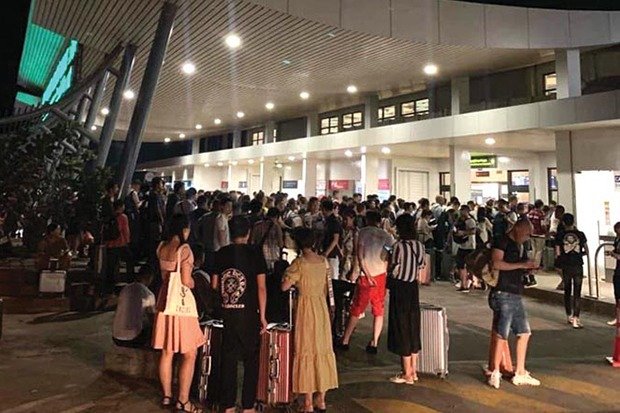Tens of thousands of Chinese nationals are reportedly leaving the kingdom following a government ban on online gambling intended to reduce the number of crimes committed by foreigners.
On Aug 18, Prime Minister Hun Sen issued a directive banning all online and arcade gambling in the kingdom in a bid to safeguard security and public order.
Hun Sen noted that some licensed online gambling operations rigged their games and threatened those who are not able to repay their gambling debt.
“Some foreigners have used this form of gambling to cheat victims inside and outside the country,” the Khmer Times on Tuesday quoted Hun Sen as saying in the directive.
“The Royal Government has decided to stop issuing licenses for such operations within and from outside the Kingdom with immediate effect.”
Brig Gen Ath Bony, deputy director of the General Administrative Department at the General Department of
Immigration, on Monday, said more Chinese nationals are leaving in comparison to arriving since the ban was enforced last month.
From Aug 18 until Sept 7, there were about 140,000 departures of Chinese nationals recorded. Meanwhile, 130,000 Chinese national arrivals were recorded in the same period.
“Since the government banned online gambling, there are more Chinese [nationals] leaving the Kingdom than coming,” he said. “It does not mean all of them are going to leave.”
However, he noted that the number of those leaving the kingdom continues to increase.
“Normally, the number of Chinese people leaving and coming remain stable,” Brig Gen Bony said. “Before, there were more arrivals than departures.”
Gen Keo Vanthan, spokesman of the General Department of Immigration, on Monday said 32,300 Chinese nationals arrived in Preah Sihanouk’s Sihanoukville between Aug 18 and 31. Meanwhile, the departure rate stood at 36,800 in the same period.
He noted that in the first eight months of this year, as many as 1.7 million Chinese national arrivals were recorded in the kingdom, while 1.6 million departures were recorded.
“I think the government measure to ban online gambling will help to reduce the number of crimes because some Chinese nationals get involved in crimes such as kidnapping and extorting money,” Gen Vanthan said. “By banning online gambling, we improve our security.”
Meanwhile, Banteay Meanchey Provincial Court in June charged 12 Chinese nationals for the kidnapping of three fellow nationals over gambling debts.
Police said the 12 accused men were gamblers and loan sharks working with a Chinese-owned casino in Poipet city.
In a separate case, six Chinese nationals suspected of kidnapping in Sihanoukville were also arrested after police raided a casino on Sunday.
The accused were arrested after they held hostage three Chinese nationals who owed them money from gambling and planned to extort money from the hostages’ families in China.
According to the Finance Ministry’s Financial Industry Department data in June, there are currently 163 licensed casinos in the Kingdom, with 91 of them located in Preah Sihanouk province.
Interior Ministry spokesman General Khieu Sopheak on Monday expressed support for the government ban, saying that the kingdom does not depend on income from online gambling.
“Frankly speaking, I fully support the measure imposed by the government,” he said. “Online gambling causes a lot of concern.”
“The online and arcade gambling contribute little income to the state but seriously affect victims. As you know, we have so far already deported more than 3,000 Chinese suspects,” Gen Sopheak added.
He noted that even with the ban, there are still a large number of Chinese tourists and investors coming to the kingdom.
“We don’t welcome online gamblers, but we welcome investors and tourists. Online gambling is useless to our nation,” Gen Sopheak said.
“The good Chinese people are still here and they continue to invest here.”
According to a recent report from the National Police, there are some 250,000 Chinese nationals living and working in the kingdom, including around 100,000 each in Phnom Penh and Sihanoukville.
Hun Sen last week reiterated instructions for authorities to eliminate all online and arcade gambling by the end of the year, saying Cambodia’s development has to be based on nature and culture tourism, not online gambling.
The Chinese government last month also expressed support for Cambodia’s decision to ban all online gambling and arcade gambling.
“We believe it will help protect both Cambodian and Chinese people’s interests,” said Geng Shuang, spokesman for China’s Foreign Ministry.
“It will also strengthen our law enforcement cooperation and friendly relations.”
“China stands ready to work with Cambodia to take effective measures to deepen law enforcement and security cooperation,” Geng added.
San Chey, executive director of the Affiliated Network for Social, on Monday, said the government ban had indeed influenced foreigners’ decision to stay in the kingdom.
However, he added that the rising number of Chinese nationals leaving the Kingdom was not only driven by the online gambling ban, but also due to a Labour Ministry announced last month to bar foreign nationals from self-employment in 10 categories of work, including as managers of human resources or administration in private companies.
“Banning foreign nationals to do several types of jobs is also part of their leaving, as Chinese nationals who attempt to find a job here face more and more obstacles, leading to their decisions to leave,” he added.




